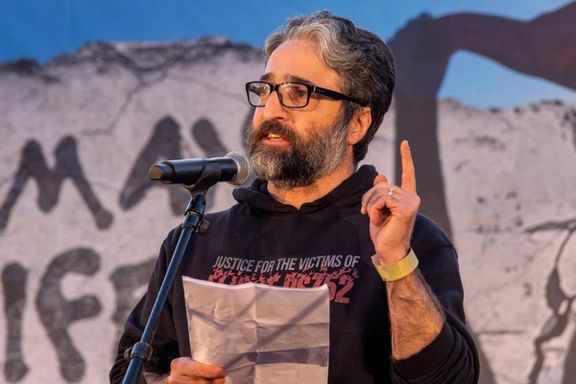Iran’s Judiciary Threatens Women Who Unveil In Public

The Islamic Republic's judiciary has threatened women who unveil in public as well as people behind the ongoing wave of chemical attacks on schoolgirls.

The Islamic Republic's judiciary has threatened women who unveil in public as well as people behind the ongoing wave of chemical attacks on schoolgirls.
Chief Justice Gholam-Hossein Mohseni-Ejei said Monday in Esfahan (Isfahan) that women violating the Islamic dress code – or hijab -- will be punished, reaffirming that the law is still in place after months of unrest and a deadly crackdown on protests ignited by the death in custody of 22-year-old Mahsa Amini. One of the ways of civil disobedience by Iranian women in the past six months has been removing their headscarves in public places.
"Removing one's hijab is equivalent to showing enmity to the Islamic Republic and its values. People who engage in such an abnormal act will be punished," Ejei said, adding that “With the help of the judiciary and the executive, authorities will use all available means to deal with the people who cooperate with the enemy and commit this sin that harms public order."
Hijab has been a contentious issue in recent months in Iran with many people not abiding by the rules and some confronting those who unveil in public. Also on Monday, Mehdi Bayati, the secretary of the government’s “Virtuous Life” working group, said that God has made hijab mandatory for Muslims according to the Quran, although this has long been a matter of debate.
Ejei also touched on the issue of the serial chemical attacks on girls’ schools and dormitories that first were reported in the religious city of Qom and spread to at least 21 of Iran’s 30 provinces. Reports suggest more than 1,000 schoolchildren have been affected by poisonings since November.
Ejei described the attacks as a “clear example of corruption on Earth,” a Sharia term that can lead to the death penalty. If the perpetrators of this action are identified and arrested, they will be sentenced to ‘corruption on Earth’ and will be punished decisively and without tolerance, he said.
His remarks came as Iran's ruler Ali Khamenei finally spoke out about the poisoning of schoolgirls in recent months and denied any government role in the attacks. If the attacks cease to happen from now on, it may be proof that the perpetrators are followers of Khamenei, strengthening speculations that they were acting following his remarks about “small punishment of youngsters” who took to the streets in anti-regime protests.

Following Khamenei’s remarks, Canada-based activist Hamed Esmaeilion -- whose daughter and wife were killed when the IRGC’s shooting shot down a Ukrainian airliner in January 2020 -- said that “a crime such as the widespread chemical attacks on girls’ schools across Iran is not possible without Khamenei knowing and ordering them; just like the fact that shooting at an airplane was not possible without his order.” Esmaeilion added that Khamenei is the prime suspect, and sentencing of the accused should start with him.
Over a thousand Iranian girls in different schools have suffered "mild poison" attacks since November, according to state media and officials, with some politicians suggesting they could have been targeted by religious groups opposed to girls' education.
However, citizens and critics on social media ask why the government has failed to arrest the perpetrators of such a large and coordinated campaign, while it was efficient in killing and detaining antigovernment protesters. Others say the hardliner establishment is behind the attacks to take revenge from schoolgirls who joined the Woman, Life, Freedom protests in October and November.